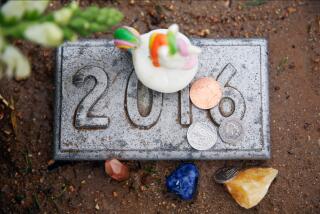Elderly Who Live Alone Eat Poorly
- Share via
SAN FRANCISCO — Older Americans who live alone are more apt to suffer from poor nutrition than those who share their home with a spouse--and women tend to be worse off than men, a new study shows.
A survey of 4,402 men and women 55 years old and older found a deficiency in mineral and vitamin intake among 22% of the women and 20% of the men living alone, compared to 18% of the women and 11% of the men residing with a husband or wife.
In the general U.S. population, 6% of the 55-to-64-year-old men live alone, 10% of those 65 to 74 and 23% of those 75 and older, while 18% of women 55 to 64, 40% 65 to 74 and 64% over 75 come home to an empty house.
Nutritional Education Urged
“Public health and food assistance programs for the elderly should focus on these groups and develop nutrition education for them,” said Maradee Davis, a UC San Francisco epidemiologist who headed the study.
The scientists examined the effect of living arrangements on dietary quality of the elderly by analyzing meals eaten by them on three consecutive days. The information was collected by the U.S. Department of Agriculture in 1977-78.
The researchers looked at whether the men and women in the study were getting the minimum recommended daily allowance of at least five of nine nutrients--vitamins A, C, thiamine, riboflavin, B6 and B12 and the minerals iron, calcium and magnesium.
Although the researchers found those with poor diets--and especially those who lived alone--ate less, they do not recommend the elderly consume more calories.
The recommended caloric intake decreases with age while recommended nutrient intake does not, the scientists point out.
Consequently, they advise the elderly to eat more foods that are rich in vitamins and minerals, such as fruits, vegetables and whole grains, and fewer high-fat foods. This recommendation is particularly important for older women because they consume fewer calories than men, the scientists said.
“In general, low-income persons living alone have poorer diets than those with adequate income who live alone,” Davis said.
More elderly men living alone had a low income than those living with a spouse, the study found. Although the single men spent more money on food than their married counterparts, their meals were poorer in nutrition, Davis said.
The study found diet worsened with age: 16% of the single males 55 to 64 years old, 20% of those 65 to 74, and 25% of those over 75 ate nutritionally deficient meals. In the married set, only 9% of the 55-to-64-year-olds and 12% of the other two groups had poor diets.
Untrained in Shopping
“Elderly men who become widowed and who live alone probably are not accustomed to food shopping and meal preparation and, thus, have poorer diets, Davis said.
Of women between 55 and 64 who lived alone, 25% had poor diets, compared to 17% for the same age group who lived with spouses. For women over 64, however, marriage did not make a nutritional difference.
Of women between 65 and 74 who lived alone, 20% had inadequate nutrition, compared to 21% for those over 75. For women living with a husband, 21% of those between 65 and 74 and 24% of those over 75 ate poorly.
“We did not analyze people living with someone besides a spouse because, especially for the men, the number was so small as to make it scientifically insignificant,” Davis said.
The findings were reported recently at the annual meeting of the Federation of American Societies for Experimental Biology in Las Vegas. The study was funded by the National Institute on Aging.



